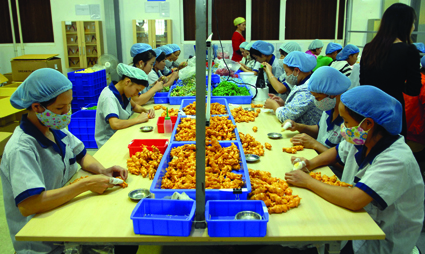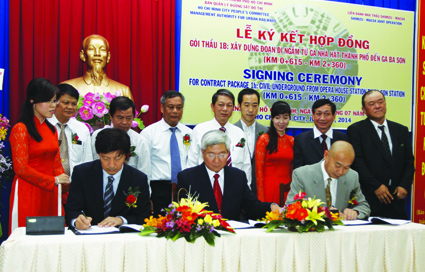The Metro-BJC deal has received public concern with the transfer price of nearly USD 900 million while its investment capital was only USD 78 million when entering Vietnam in 2002. Despite Metro’s unceasing increase in revenues, the group had reported its consecutive annual loss for 11 out of 12 years of operation in Vietnam. What is your viewpoint about this issue?
We can see on its website that Metro Cash & Carry Group is the world’s leading giant wholesaler with its head office in Germany. At present, there are more than 750 wholesale supermarkets operating under METRO and MAKRO trademarks in 28 European and Asian countries, employing 110,000 people and generating around EURO 32 billion in the 2012-13 fiscal year, serving more than 21 million customers such as hotels, restaurants, independent retailers, agencies and organizations with 20,000 food products and 30,000 technological products at attractive prices.
With its trademark history, global prestige and social responsibility, in principle, Metro never squanders its past and current successes. It’s hard for me to analyze and assess accurately the enterprise administration and finance unless I access its audited figures, records and financial statements. This is professional work of tax authorities and other state management agencies related to the grant of licenses and inspection of licensed enterprises’ operation.
Metro is a large multi-national group with a complicated governance system but the system is open and transparent according to standards of the developed countries. The group’s future development prospects are much more important than its financial results. Metro is likely to temporarily sacrifice its short-term objectives for long-term gains.
It will be difficult to expand production when enterprises’ financial capabilities are limited due to continuous losses. I think Metro’s case is different. They have a long-term investment strategy apart from short-term business plans. They may suffer short-term losses due to unceasing capital mobilization for expanding their business network, setting up a domestic and export supply and consumption chain, establishing their relations with customers, building trademarks and training to improve human resources quality. All of these incur significant financial costs. We can see that their strategy is a success.

It can be seen that Metro’s reported cumulative losses and unceasing expansion of its system are abnormal. Could you talk about tax authorities responsibility for this issue?
Metro has entered Vietnam for more than 12 years and now has 19 wholesale stores with advanced selling technology and the most civilized service attitude towards values for customers. These stores are located in busy urban centers whose residents’ income is highest in Vietnam and that are fast developing and prospective consumption markets in the country. The group has established the Fruit and Vegetable Distribution and Logistics Center in central highland Lam Dong province and the Fresh Fish Distribution Center in Can Tho city.
Considering the chain of wholesale stores in prime locations and its fresh food logistics center with a strong brand identity, large market share and a proficient, professional and high quality staff, I think nearly USD 900 million for all is a reasonable price. This is not to mention the country’s complicated administrative procedures related to land recovery and allocation, compensation for site clearance, grant of construction license and fresh food business license, food hygiene and safety, trademarks and import and export procedures and these add up to the value of the chain set up by Metro. I do not think our tax authorities fail to take thorough care of Metro but vice versa. The envy is that they can do but we have not been able to do it.
The grant of investment licenses to Metro and many other FDI projects with many incentives, even rolling out the red carpet and excessive incentives, has caused much public concern. So what is your assessment of the supervision of legal documents relating to foreign investment activities in Vietnam?
I believe that we already had rational regulations to attract foreign direct investment (FDI) for each development period with specific historical conditions. It is not easy to attract FDI in the world of globalization with free investment flows. There have been excessive incentives in this locality or the other, but in general, we have over the past 26 years attracted significant resources for the country’s development with more than 15,000 FDI projects and more than USD 100 billion out of the total registered capital of USD 200 billion have been disbursed, thus fundamentally changing the country’s economic structure and improving its competitiveness.
By now, a number of regulations on investment incentives of the previous period need to be re-considered in a more detailed and rational manner in comparison with those applied in other regional countries at the same development level and in light of multilateral and bilateral free trade and investment agreements. The NA discussed and gave opinions on the revised Investment Law at the seventh session and will further consider and approve the law in its coming eighth session. The revised Investment Law will definitely create a more transparent legal corridor to attract investment in a transparent investment environment, ensure investors’ interests and bring about the highest benefits to the country’s socio-economic development. It will also work out rational investment incentive policies in the direction of establishing clear principles and norms and specifying subjects eligible for investment incentives, and conditions and procedures for enjoying investment incentives and supports.
Does the NA Committee for Finance and Budget have a program on supervision and prevention of tax evasion and transfer pricing of FDI enterprises?
Under its statutory functions and duties, the Committee for Finance and Budget has annually organized inspection and supervision teams to examine the implementation of provisions on tax administration in a number of localities and large enterprises, especially during the verification and assessment of annual state budget collection and spending policies presented by the Government at the NA sessions. The committee has paid due attention to violations of the tax law.
A number of the committee’s proposals and recommendations concerning tax administration have been realized. The tax and customs sectors have exerted their utmost efforts to inspect in order to detect violations and collect payable tax amounts into the state budget. Many violations such as tax evasion and fraud and transfer pricing committed by both domestic and foreign enterprises have been detected and fined in accordance with law and taxes have been retrospectively collected. This is the finance sector’s work regularly done under the strict supervision of the NA’s corresponding agencies.
The international community assesses Vietnam’s retail system as a huge potential. Through the deal between Metro and BJC, what is your opinion on the encouragement of domestic investors’ participation in the country’s retail system to better implement the “Vietnamese people give priority to Vietnamese goods” campaign as well as raising relevant agencies and localities’ capabilities to appraise and assess FDI projects in terms of finance to avoid state budget losses?
The production output is consumption. If products are not sold, production will be stagnant. With the current population of 90 million, and the figure will be stabilized at almost 120 million, the country is considered a populous one in the world and that means it is a potential consumption market. It is not easy to gain a foothold in such market. The world’s big trade conglomerates have kept a close watch on Vietnam.
Metro, Big C, Aeon, and BJC will certainly be followed by other names. Vietnam’s retailers like Saigon Coop, Maximark, Citimart and Fivimart are speeding up their network expansion. No matter where investors come from, local goods still dominate like in Metro with the rate of 90 percent.
I believe that opportunities are equal for both domestic and foreign investors in terms of investment law but the selection of services and trademarks is consumers’ right. The “Vietnamese people give priority to Vietnamese goods” must enter the Vietnamese mind and must not just stop short at a campaign slogan, as the Japanese and Republic of Korean people have done.
I hope the Metro-BJC deal is a lesson of immediate relevance for policymakers as well as domestic businesses. I believe that through this lesson, Vietnamese enterprises will be successful in building Vietnamese trademarks in a fierce competition in the “home field” to affirm Vietnam’s intelligence.-


